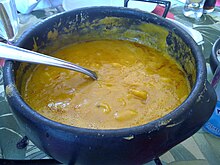Bobó de camarão

Bobó de camarão, sometimes referred to as shrimp bobó in English, is a chowder-like Brazilian dish of shrimp in a purée of manioc (or cassava) meal with coconut milk, herbs, ginger, and other ingredients.[1]
Origin
Shrimp bobó is nearly identical to the West African dish Ipetê,[2] and it is one of the many iconic recipes from the Bahia region of Brazil, which is known for its heavy Afro-Brazilian characteristics.[3] The name bobó comes from the Fon word bovô.[4]
Preparation
Like many similar dishes, it is flavored with palm oil, called dendê in Brazilian Portuguese. It is traditionally served with white rice, but it may also be served with another manioc dish called pirão or with the ritual Candomblé dish acaçá. It can also be treated as a standalone side dish. In the state of Espírito Santo, due to Italian influences, olive oil is used instead of palm oil.
 |
| Part of a series on |
| Brazilian cuisine |
|---|
| Types of food |
| See also |
-
Bobó de camarão served at a restaurant in Rio de Janeiro
-
Bobó de camarão being enjoyed in a restaurant at Porto Alegre City, Rio Grande do Sul State
See also
References
- ^ Danny Palmerlee (1 March 2007). South America on a Shoestring. Lonely Planet. p. 402. ISBN 978-1-74104-443-0.
- ^ Cherie Hamilton (16 August 2005). Brazil: A Culinary Journey. Hippocrene Books. pp. 66–67. ISBN 978-0-7818-1080-7.
- ^ Maria Baez Kijac (10 September 2003). The South American table: the flavor and soul of authentic home cooking from Patagonia to Rio de Janeiro, with 450 recipes. Harvard Common Press. p. 270. ISBN 978-1-55832-249-3.
- ^ FERREIRA, A. B. H. Novo dicionário da língua portuguesa. 2ª edição. Rio de Janeiro. Nova Fronteira. 1986. p. 266.


